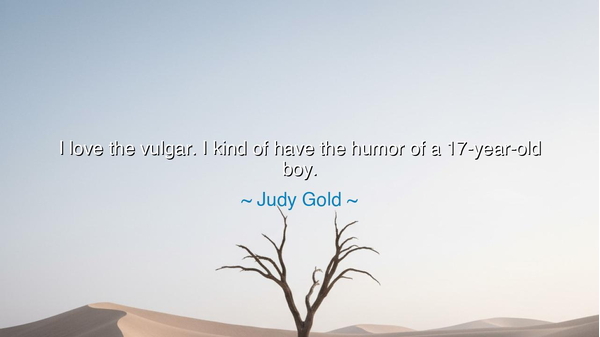
I love the vulgar. I kind of have the humor of a 17-year-old boy.






When Judy Gold said, “I love the vulgar. I kind of have the humor of a 17-year-old boy,” she was not confessing immaturity — she was declaring freedom. Her words, playful on the surface, carry the pulse of rebellion beneath them. In a world that polishes, censors, and conceals, her love for the vulgar — for the raw, the unfiltered, the earthy laughter of youth — is a stand against pretense. She speaks as one who understands that humor is not meant to be delicate porcelain; it is meant to be alive, loud, and full of the same imperfections that make life itself beautiful.
In the ancient sense, vulgar did not mean obscene — it meant of the people. The vulgus were the common folk, those who lived and worked and laughed without artifice. They were the bakers, the farmers, the soldiers, and the lovers who found joy in life’s most ordinary moments. Judy Gold’s words echo this ancient meaning: she celebrates the humor that belongs to the people, not the thrones. The “humor of a 17-year-old boy” she describes is the humor of unrestrained life — unashamed of its body, its desires, its laughter. It is the voice of youth, unburdened by fear of judgment, laughing at the very rules that seek to tame it.
Throughout history, the vulgar and the sacred have often danced together in uneasy partnership. The medieval jesters, those strange prophets of laughter, used crude jokes to pierce the armor of kings. Beneath their vulgarity was wisdom — for only the fool could speak truth to power without losing his head. Even Aristophanes, the great Athenian playwright, filled his comedies with ribald jokes, bodily humor, and earthy laughter. Yet through them, he exposed hypocrisy, greed, and pride. His vulgarity was not degradation; it was revelation. Judy Gold stands in that lineage — one of the truth-tellers who use laughter to expose the absurdities of life.
Her affection for the “humor of a 17-year-old boy” is not a wish to remain childish, but to preserve wonder and irreverence in a world that has grown too solemn. At seventeen, laughter bursts from the belly, not the mind. It is instinctive, spontaneous, and fearless. It mocks power, questions authority, and finds joy even in the forbidden. In this sense, her humor is a kind of spiritual youth, a refusal to let the heart grow brittle with age. For as the ancients taught, the soul that can still laugh at the foolish and the divine alike has not yet died to life.
We see this spirit throughout the ages — in the taverns of Shakespeare’s England, where bawdy jokes mixed with poetry; in the streets of Rome, where graffiti mocked emperors and celebrated love; in the sketches of modern comedians, who wield vulgarity not to offend, but to connect. The vulgar is not an enemy of refinement — it is its necessary balance. Without the earthiness of laughter, intellect turns cold. Without the rawness of honesty, art becomes hollow. Judy Gold’s embrace of the vulgar is, at its core, a defense of authenticity — a reminder that to laugh without shame is to live without chains.
Her quote also speaks to courage. For in every age, society has sought to tame laughter — to label it proper or improper, acceptable or obscene. The powerful have always feared what cannot be controlled. Yet those who love the vulgar, like Judy Gold, remind us that humor belongs to everyone. It breaks barriers, dissolves fear, and restores equality. In laughter, the queen and the beggar stand side by side, equally human. Thus, her humor is not immaturity — it is democracy of the spirit, an equalizer that reminds all people of their shared absurdity and grace.
So let this be the lesson: do not fear the vulgar within you. Let your laughter be bold and unashamed. Speak truth, even if it comes wrapped in jest. Allow humor to remind you of your humanity, your imperfection, your glorious foolishness. Be, as Judy Gold is, unafraid to laugh at what others whisper about, for that laughter will keep your soul alive when solemnity turns to stone.
For in the end, the vulgar is not the enemy of virtue, but its companion — the laughter that keeps wisdom humble, the humor that keeps sorrow from consuming the heart. As Judy Gold reminds us, to laugh like a seventeen-year-old boy is not to regress, but to remember: that life, even in all its absurdity, is still magnificent — and meant to be lived with joy, irreverence, and laughter that reaches all the way to the soul.






AAdministratorAdministrator
Welcome, honored guests. Please leave a comment, we will respond soon